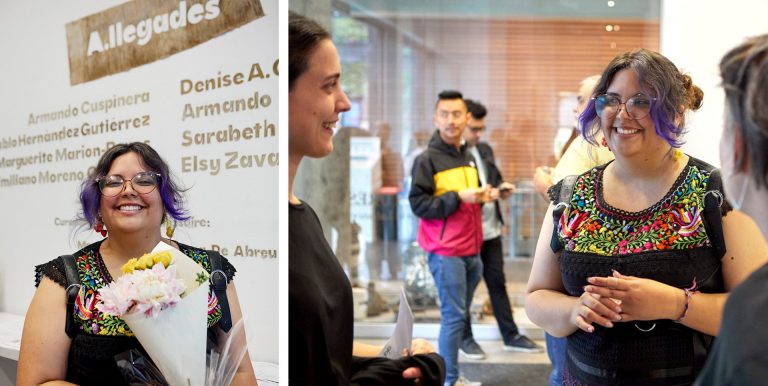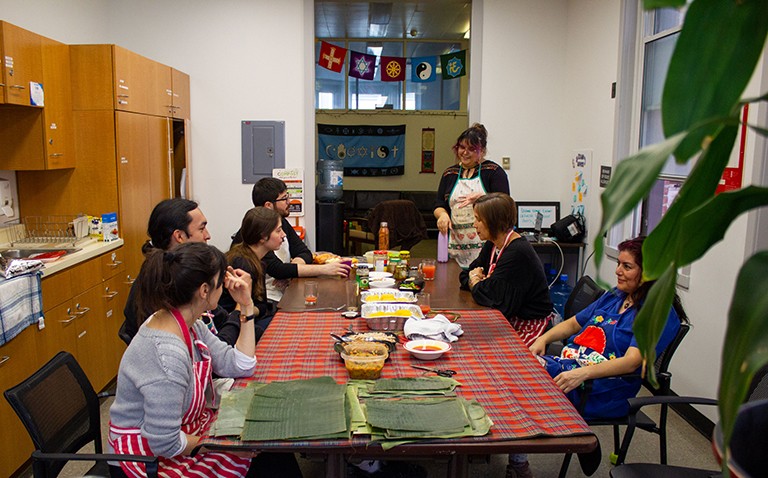Concordia’s FOFA Gallery curator-in-residence explores Latinx diaspora through art

Earlier this year, the A.llegades exhibition at Concordia’s FOFA Gallery shed light on themes of identity, migration and resilience. Organized by the gallery’s curator-in-residence María Andreína Escalona De Abreu, BFA 22, the exhibition was held under the banner “Together in the Diaspora.”
Escalona brought together works by eight artists from Chile, Colombia, Mexico and Venezuela to weave an interconnected tapestry of ideas. The artists, who all come from first- or second-generation immigrant backgrounds, presented work that embraced their Latinx identities.
Their work explored connections to their cultural roots while speaking to the multicultural Canadian context. Featuring a versatile array of artworks, including woven textiles, sculpture, narrative and performance, the works were stitched together by the common thread of resilience.
Escalona is a Venezuelan visual artist, writer and independent curator based in Montreal. Since her graduation from Concordia, Escalona has been actively developing her curatorial practice as FOFA Gallery’s curator-in-residence, with additional support from the Art Volt program.
This year, she will also receive support from Art Volt to develop cultural mediation activities at the FOFA Gallery.
‘For me, it’s important to notice that every perspective is valid and beautiful’
Please provide insights into your recent exhibition, A.llegades. What were the central themes and messages you aimed to convey with the curated work?
María Andreína Escalona De Abreu: A.llegades, which took place this summer, was inspired by my own migratory journey here to Montreal. I wanted to bring together the community, specifically the Latinx community, and discuss topics that I felt some of us wanted to talk about. These topics include sentiments of nostalgia, loss, grief, displacement and incompleteness that one can feel when parting from their country, families, friends, home, etcetera.
But it also includes the experiences of joy, discovery, curiosity, friendship, learning and giving with a newfound community. The title of the exhibition is itself a hybrid of three different words, mimicking the complex reality of immigrants. They are: llegar (to arrive), allegado/allegada/allegade (someone very close to you without a family bond) and the prefix a that can either be proximity, contiguity, intensity, opposition or lack of something.
 “The community-building process was more important to me than the final pieces exhibited in the show.”
“The community-building process was more important to me than the final pieces exhibited in the show.”
How did you proceed in collaborating with the artists?
ME: In the early planning stages, I asked the artists to think about the question, “How do you live your latinidad in Montreal?” Latinidad is already a complex term to tackle because everyone has their own take on it. That’s what I was interested in: the multitude of meanings. Every artist — even myself and my assistant curator, Pierina Corzo-Valero — interpreted the question from a different experience, background and materiality.
For me, it’s important to notice that every perspective is valid and beautiful. It only enriches our experience and journeys in our newfound identities and connections. The community-building process was more important to me than the final pieces exhibited in the show. I think that was the case for those involved and for those who came to visit and identified with the themes, too.
How has your artistic approach evolved over the past year, particularly considering your experience at the gallery?
ME: The FOFA team has truly provided me space and support to develop a curatorial practice that is based on intentionality, care, self-compassion and transparency. This experience has been a massive beam of light for my career, with loads of opportunities and teaching moments not only as a curator, artist, or colleague, but also as a more confident and prepared professional. Specifically, under the mentorship of Nicole Burisch, FOFA Gallery director, and Geneviève Wallen, an Art Volt mentor, I have learned about interpersonal communication, arts administration, creativity outside the studio/object-making, practices of care and many other aspects. Many things that I didn’t consider or were not imparted to me during my BFA.
These teachings that were passed on to me have greatly impacted my artistic practice beyond exhibition planning, whether intentionally (during training, meetings, or projects) or unintentionally (via the nurturing team environment.) I can see my career already merging curation and artmaking into a caring and more sustainable artistic practice thanks to this experience.
How has your role as the FOFA Gallery’s curator-in-residence influenced both your artistic and curatorial practices?
ME: During my time at the gallery, I have learned so much about sustainable practices in the arts. I see two sides to it. Thanks to the sustainability initiative led by Jasmine Sihra, I have realized that there are wasteless or less wasteful alternatives to creating an exhibition, an event, an artwork, or even daily professional routines. For example, we can incorporate relevant and already existing materials to signage, like the plantain leaves that we use for A.llegades, or print less didactic material, or buy less single-use plastic products and food when planning a vernissage.
Sustainability goes beyond material waste but implicates practices of care, transparency and durability. For example, how does one sustain a healthy and balanced career in the arts? What are the opportunities and resources out there that support creators in Montreal, Quebec and Canada? How do the intersections of racialized, gendered and social experiences affect our lives and professions? And how can we fight those power imbalances through collaboration, resource-sharing, open communication, etcetera?
Please elaborate on how the Art Volt program has been instrumental in supporting your transition into a professional career?
ME: Since I graduated in 2022 with a BFA in fibres and material practices, I have experienced different opportunities offered by Art Volt. For example, I’ve attended their mentorship program, their grant writing workshop in fall 2022 and other professional development workshops and cultural outings. For the mentorship program, Geneviève Wallen organized multiple encounters throughout the year for me and three other mentees. The three of us experienced a beautiful space of support, resource-sharing and slowness that deeply changed my way of seeing the artistic process and the artistic community.
During the grant writing workshop, I was very fortunate to participate in an intensive and well-rounded program that allowed me to exercise my writing muscles, my creative process and my professional skills. This experience resulted in a successful grant application with the Conseil des arts et des lettres du Québec (CALQ) that allowed me to expand the scope of A.llegades.
With the different activities, events, workshops and mixers that Art Volt organized, I saw myself growing my social and practical skills and learning more about the Montreal arts scene. I’m very thankful to Marc Wieser, supervisor of strategic initiatives portfolio at Concordia, and Fannie Gadouas, coordinator of Art Volt and special projects in the Faculty of Fine Arts, for their support and openness after my time as a student at Concordia.
What upcoming projects and aspirations do you have as an artist and curator?
ME: My next projects are all fruits of my interest in meshing my curatorial and my artistic practice. This fall I will be launching a workbook and a series of workshops at the FOFA Gallery. These projects will invite the public to write in the gallery and create texts directly inspired by the artworks. The schedule for these sessions will be announced soon.
Next year I will be curating a second exhibition at the gallery in July. This exhibition will broadly explore the theme of sustainability as a practice of love. Also starting next year, I’m very happy to announce that I will be part of the team of Céline Bureau, a non-profit artist residency, as their 2024 residency program coordinator. In my personal practice, I will be exploring papermaking and bookmaking as a way to collaborate and find alternatives spaces for curation.
Check out what’s on and what’s coming up at Concordia’s FOFA Gallery.




